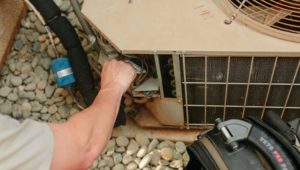Anytime technicians cut open the refrigerant lines to the air conditioning or heat pump system, we have to ensure the interior of those lines doesn’t get debris and other contaminants in them. We can’t prevent air and moisture from getting in them, which is why we need to evacuate systems thoroughly. If we don’t, a form of acid will develop inside the compressor and eat away at the protective lining that surrounds the copper stator windings.
Moisture and POE Oil
R-410A systems use Polyol ester oil (POE Oil) which is a hygroscopic oil. POE oil retains water in the air a lot more than the mineral oil (R22) systems. That’s why we have to evacuate the system of as much moisture as possible. Technically, we’re not supposed to leave the lines open for more than 15 minutes. That’s hard to do when replacing a major component like a compressor or evaporator coil. If exposed long enough, it’s best to replace the compressor oil to the levels printed on the data label on the side of the compressor. This is because no matter how long we have the unit on a vacuum, that moisture will never be removed from the compressor oil.
When a system is flat on charge, meaning there is no refrigerant left in the system because it all leaked out, it can be assumed that air is now in the system. There’s no vacuum left in the lines, so the leak needs to be repaired and then evacuated to 500 microns or less again to get it back to normal. Does this mean if the system is flat, the lines have been open longer than 15 minutes? I would assume so. Should we change the oil in the compressor? I guess so. Do any techs do it? Probably not.

Filter driers catch remaining moisture
Because it’s so hard to get all the moisture in the lines evacuated, we always install a filter drier. A good filter drier has desiccants inside it that will absorb residual moisture in the lines as it flows through the system. Even then, only so much moisture can be absorbed by a filter drier. A clogged filter drier will start restricting the normal refrigerant flow and even cause flash gas causing abnormal operation. You can tell if a filter drier is clogged by measuring the temperature of the liquid line before and after the filter drier. If the difference is 3 degrees or more, changed the filter with a new and properly sized one.
It’s so important for technicians to ensure there is no moisture from the atmosphere left in the lines when we turn the system on. There are tools, components, and procedures to help with this. If we don’t do it right, we are only doing a disservice to the customer because the electrical and mechanical parts of the AC system will eat away from acid that forms inside of it.

Professional, knowledgeable service is essential when it comes to the air conditioner. Don’t just call anyone out to service your system. Call Fox Family or even book online at the top of the page.
Fox Family Heating & Air serves Sacramento, Rancho Cordova, and all of Northern California. If you’re looking to schedule HVAC service in these areas, give us a call!
That’s it for this week. Check us out on the next blog!



















